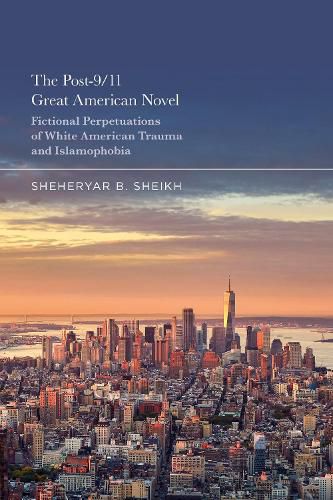Readings Newsletter
Become a Readings Member to make your shopping experience even easier.
Sign in or sign up for free!
You’re not far away from qualifying for FREE standard shipping within Australia
You’ve qualified for FREE standard shipping within Australia
The cart is loading…






A study of the confluences between liberal white Americans' trauma, their reverting to hyper-conservative Islamophobia, and Don DeLillo's call to American authors that they compose a new so-called 'Great American Novel' pluriverse in the wake of 9/11.
In December 2001, Don DeLillo urged American writers to create "the counternarrative" that would reclaim control of culture in a call for nation-rebuilding fiction that mirrors John William de Forest's original post-Civil War coinage of the term and concept of the "Great American Novel." Through this conceptual framework, Sheheryar Sheikh examines four major post-9/11 works to demonstrate a concerted effort by these authors to address the "Muslim Question" in novels that feature and critique traumatized white Americans creating mechanisms with which to mitigate the trauma of 9/11 as it resurges at even the thought of Muslims existing in America after 9/11.
By looking at repression, appropriation, adversarial othering, and enforced secularization as they appear in Jonathan Safran Foer's Extremely Loud & Incredibly Close, John Updike's Terrorist, DeLillo's Falling Man, and Amy Waldman's The Submission, this study shows the iterations of "solutions" and the abandonment of these ideals by traumatized white liberals. While the original concept of the Great American Novel featured fluid and multifaceted explorations of the American Dream, The Post-9/11 Great American Novel shows how this renewed interest in creating nation-rebuilding texts threatened to stagnate and calcify this literary form. Specifically, because these texts primarily congeal around the occlusion of Muslims and Islam within and from the United States.
$9.00 standard shipping within Australia
FREE standard shipping within Australia for orders over $100.00
Express & International shipping calculated at checkout
A study of the confluences between liberal white Americans' trauma, their reverting to hyper-conservative Islamophobia, and Don DeLillo's call to American authors that they compose a new so-called 'Great American Novel' pluriverse in the wake of 9/11.
In December 2001, Don DeLillo urged American writers to create "the counternarrative" that would reclaim control of culture in a call for nation-rebuilding fiction that mirrors John William de Forest's original post-Civil War coinage of the term and concept of the "Great American Novel." Through this conceptual framework, Sheheryar Sheikh examines four major post-9/11 works to demonstrate a concerted effort by these authors to address the "Muslim Question" in novels that feature and critique traumatized white Americans creating mechanisms with which to mitigate the trauma of 9/11 as it resurges at even the thought of Muslims existing in America after 9/11.
By looking at repression, appropriation, adversarial othering, and enforced secularization as they appear in Jonathan Safran Foer's Extremely Loud & Incredibly Close, John Updike's Terrorist, DeLillo's Falling Man, and Amy Waldman's The Submission, this study shows the iterations of "solutions" and the abandonment of these ideals by traumatized white liberals. While the original concept of the Great American Novel featured fluid and multifaceted explorations of the American Dream, The Post-9/11 Great American Novel shows how this renewed interest in creating nation-rebuilding texts threatened to stagnate and calcify this literary form. Specifically, because these texts primarily congeal around the occlusion of Muslims and Islam within and from the United States.